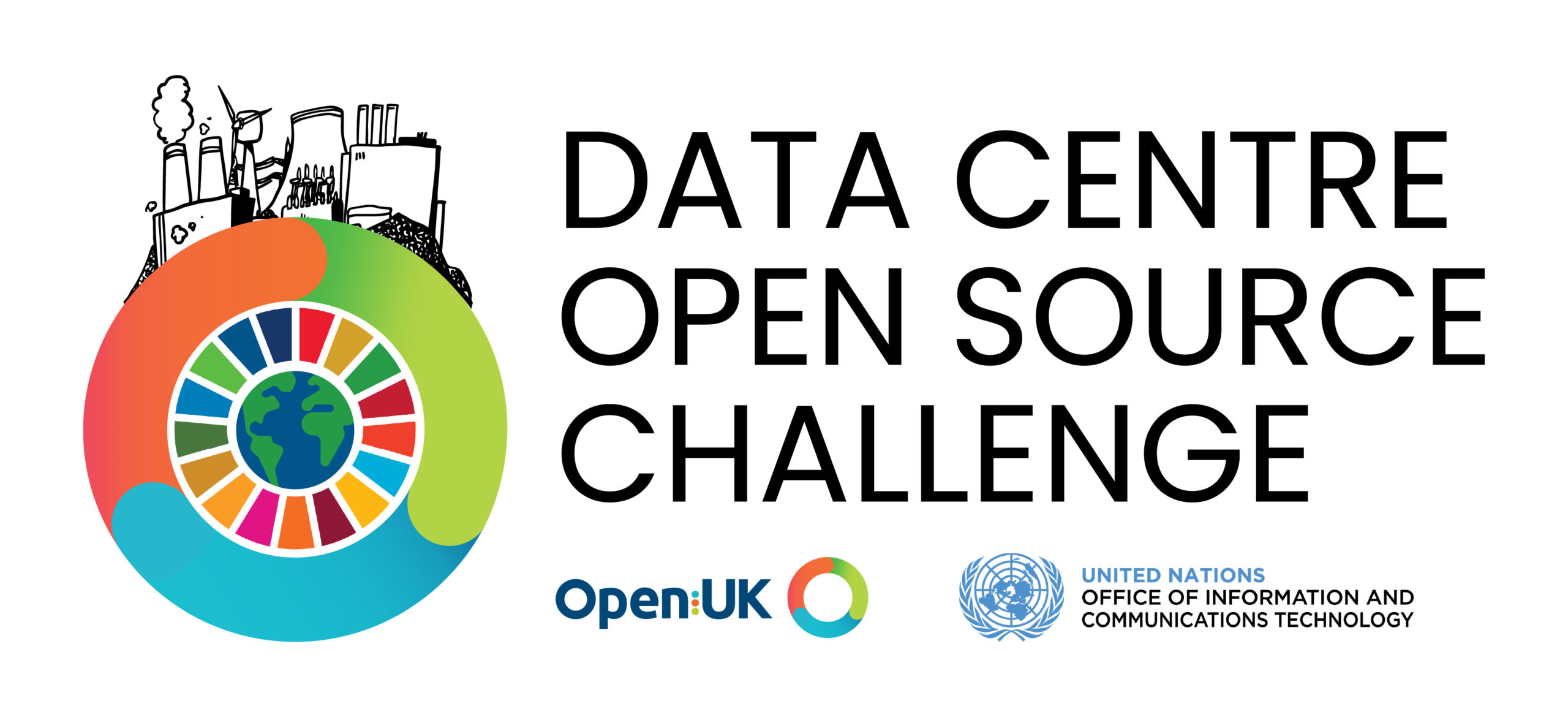OpenUK is delighted to be partnering with the United Nations (UN) on a Challenge for its Data Centre Blueprint known as “Patchwork Kilt”.
Participants in the challenge will contribute open source solutions that help create a carbon-negative data centre model and the best contribution will win a prize.
The challenge will bring together a broader community for contributions to Patchwork Kilt. Participants have the opportunity to make contributions through an array of different fields developing carbon neutral solutions for data centres.
The areas include:
- Heat redirection: Develop an open source software solution to monitor and redirect heat produced in data centres.
- Building repurposing: Participants will create an open source tool to better re-evaluate urban spaces, finding brownfield sites that can be re-used for data centres.
- Heat reuse: A statistical analysis of open datasets to identify areas to repurpose waste – heat
- Circular supply chain: Build an open source software solution that manages the lifecycle of critical data centre components
- Blueprint evolution: Analyse the data from Patchwork Kilt for insights into how to supercharge global sustainability efforts.
- Community empowerment: Providing communities with actionable insights from data centres that can be used to build more sustainable cities
The winning Challenge contributor will be invited to celebrate their success at OpenUK’s State of Open Con 24 on 6 and 7 February. They will be given an opportunity to do a short presentation on their contribution and OpenUK will cover the cost of their ticket, 2 nights’ accommodation and an economy flight.
Submissions are to be made to the UN’s Unite platform. The submissions platform will open on 11 October and close on 10 November. Entry to the Challenge is subject to our terms and conditions and any submission made will accept these terms and conditions.
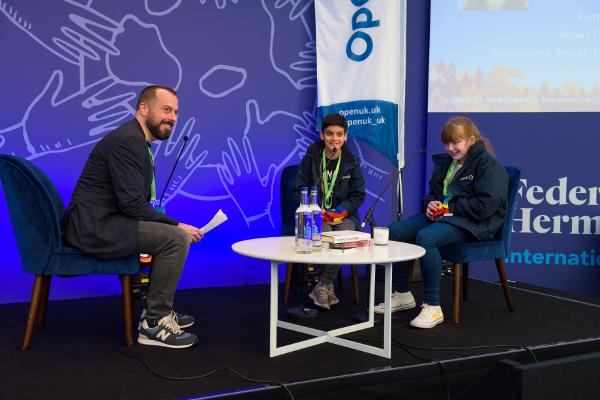
OpenUK’s Data Centre Blueprint was launched at COP26 by Cristian Parrino our first Chief Sustainabilty Officer – the first in any open source organisation. He was joined on the stage at COP26 by Ronan and Faith who also feature in our launch animation.
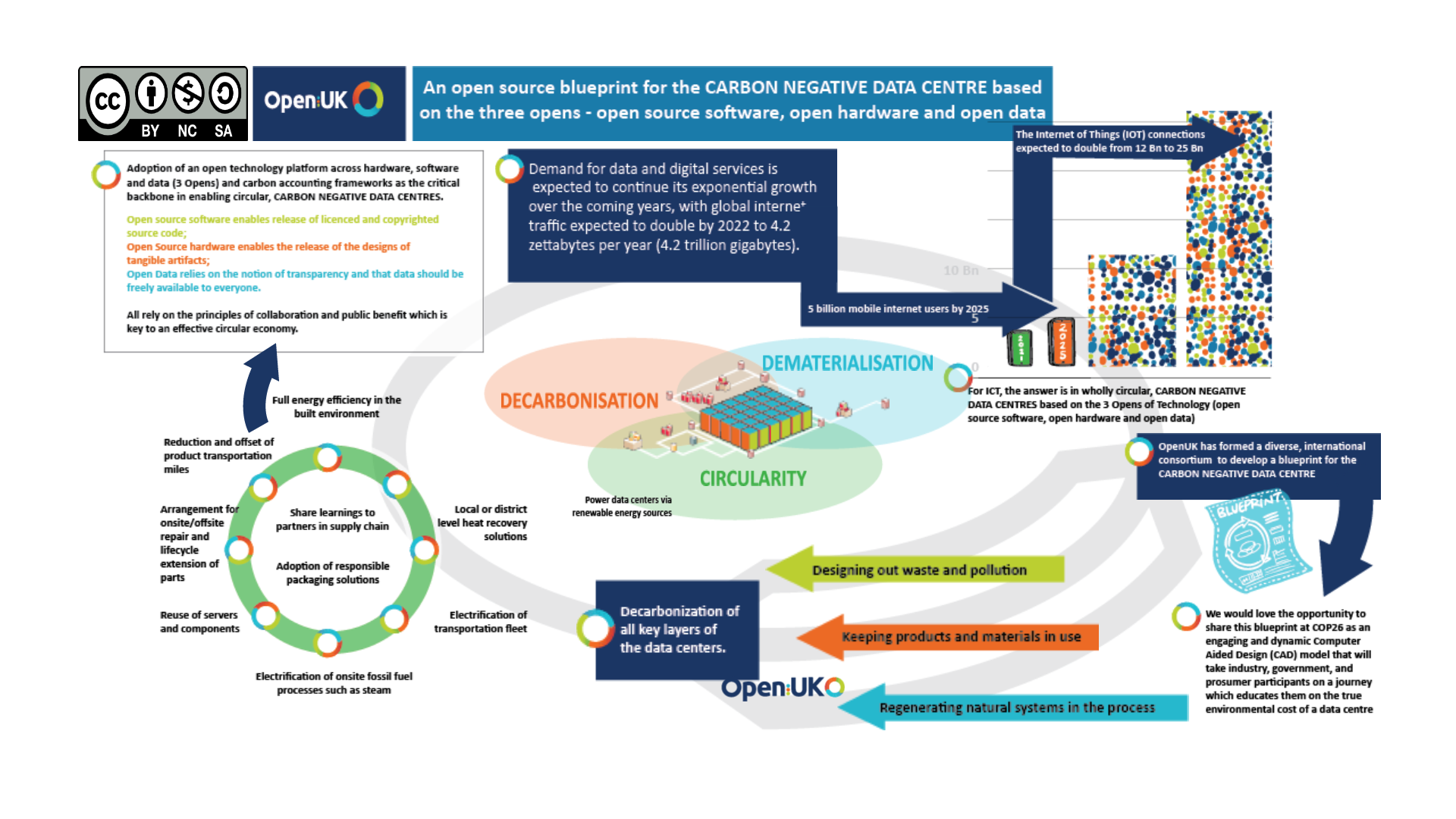
Today OpenUK is building a community around it led by Chris Lloyd Jones, OpenUK’s Chief Blueprint Officer. At any time you can become a part of that community and contribute on our GitHub repository, subject to our contribution policy.
You can see more about how our Blueprint works here:
The Challenge will allow you to contribute to the OpenUK Blueprint and become a part of our Community. You can take part in the Challenge from 11 October to 10 November. All contributions are subject to the OpenUK Contribution policy available on GitHub.
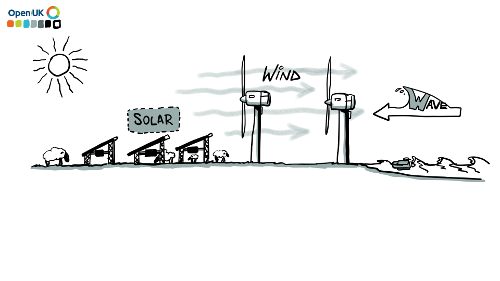
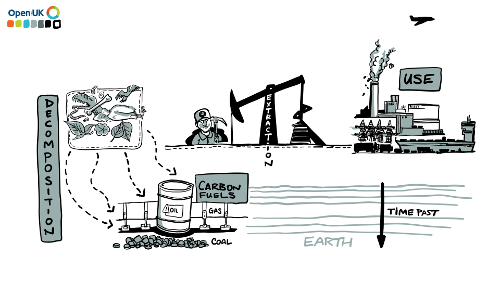
OpenUK Open Source Software Challenges:
1. Heat Redirection – Development Challenge
Background
Develop open source software to monitor heat generation in data centres and direct this heat towards applications that can provide value. Your software should be intelligent enough to direct this heat towards applications that can provide value. Imagine using this “waste” to stimulate sustainable agriculture or warm marginalised communities. With your software, heat becomes a commodity, not a byproduct.
Objective
Develop an Open Source application which directs, uses, or measures data centre heat, and creates value. You must submit a code repository URL which is publicly accessible (e.g. GitHub, GitLab, etc) with a link to run your project, and documentation to run the project.
You should provide a video (maximum 2 minutes) that describes your project, the problem it solves and how it solves it, making sure to relate your project to the challenge.
Sources
Any technology stack may be used, but the application must focus on a problem identified by the Patchwork Kilt blueprint.
2. Building Repurposing – Development Challenge
Background
In a world where remote work and edge computing are prompting a re-evaluation of urban spaces, insights are needed about potential spaces that could be repurposed into data centres for edge computing, considering factors such as location, size, power supply, and connectivity. Develop an open source tool to analyse this data and envision and design solutions to utilise these spaces effectively. The goal is not just to identify potential areas for repurposing but also to generate innovative ideas for their transformation. As we reshape our urban landscapes, your software could play a critical role in that transformation. Push boundaries, imagine the possibilities, and propose solutions to revitalise these spaces.
Objective
Develop an Open Source application which generates insights on re-using brownfield or greenfield space for new initiatives, such as (but not limited to) re-purposing spaces for datacenters or edge computing. You may also focus on other urban initiatives.
You must submit a code repository URL which is publicly accessible (e.g. GitHub, GitLab, etc) with a link to run your project, and documentation to run the project.
You should provide a video (maximum 2 minutes) that describes your project, the problem it solves and how it solves it, making sure to relate your project to the challenge.
Sources
Any technology stack may be used, but the application must focus on re-use of space. Datasets used must be open – on an open data licence from Creative Commons, CDLA or similar.
3. Heat Reuse – Data Challenge
Background
As we reduce emissions, there remains the inevitable challenge of heat re-use whether that is heating a swimming pool or providing heating to communities. Develop a re-use of outputs that includes an open source tool to analyse this data or otherwise creates an open data environment. The goal is not just to identify potential areas for repurposing the heat but also to provide a practical next step. As we reshape our urban landscapes, your software could play a critical role in that transformation.
Objective
Use open datasets to create visualisations, machine learning models, or another form of statistical analysis (including use of generative AI) to identify areas to re-purpose waste heat.
You must submit a URL which allows us to see and reproduce the results of your work. That could be a visualisation (such as in Dash, PowerBI, Tableau), a dataset on Kaggle, GitHub or other repository which is publicly accessible, along with documentation to understand and view your project, and the associated data lifeycycle.
You should provide a video (maximum 2 minutes) that describes your project, the problem it solves and how it solves it, making sure to relate your project to the challenge.
Sources
Your solution must use or produce open datasets – on an open data licence from Creative Commons, CDLA or similar. Custom machine learning models must use open source libraries (e.g. huggingface).
4. Circular Supply Chain
Background
This challenge is your chance to impact our planet’s future, redefining supply chains and moving closer to a truly circular economy. Develop an open source software solution focussing on the circular supply chain for the Patchwork Kilt Data Centre. This tool should manage the lifecycle of critical components, from reuse and repair to recycling. But that’s not all – your solution should also track transportation miles and packaging solutions, focusing on reducing environmental impact and promoting sustainability. Then – think bigger – beyond the blueprints; also consider how the principles and mechanisms you develop could be adapted to other supply chains. This is more than a programming task – it’s an opportunity to influence a paradigm shift towards a circular economy in multiple industries.
Objective
Develop an Open Source application which manages the components and lifecycle for a data centre supply chain, taking into account the UN SDGs and the environmental impact of the data centre industry. Focus on the areas identified in the Patchwork Kilt Blueprint.
You must submit a code repository URL which is publicly accessible (e.g. GitHub, GitLab, etc) with a link to run your project, and documentation to run the project.
You should provide a video (maximum 2 minutes) that describes your project, the problem it solves and how it solves it, making sure to relate your project to the challenge.
Sources
Any technology stack may be used, but the application must focus on re-use of space. Datasets used must be open – on an open data licence from Creative Commons, CDLA or similar.
5. Blueprint Evolution – Data Challenge
Background
Adopt and mash-up data from the Patchwork Kilt Data Centre to “reboot” our planet. This challenge is your playground to explore, innovate, and evolve by remixing the blueprint data, injecting your unique updates, or crafting extraordinary applications. The objective isn’t just to understand the data but to shape it into solutions to supercharge our global sustainability efforts. Success in this challenge will not be measured solely by the sophistication of your analyses but by your ability to evolve these foundational blueprints, breathe new life into them, and present fresh, transformative applications that will redefine our understanding of energy use and drive sustainable operations.
Objective
Use open datasets to create visualisations, machine learning models, or another form of statistical analysis (including use of generative AI) to remix the data in the Patchwork Kilt Blueprint, or contribute back to the Blueprint itself.
Contributions to the Blueprint
You must submit a pull request to the Patchwork Kilt Blueprint built on top of an open dataset, and an open source licence that we can incorporate into the blueprint.
Remixes of the Blueprint
You must submit a URL which allows us to see and reproduce the results of your work. That could be a visualisation (such as in Dash, PowerBI, Tableau), a dataset on Kaggle, GitHub or other repository which is publicly accessible, along with documentation to understand and view your project, and the associated data lifeycycle.
Sources
Your solution must use or produce open datasets – on an open data licence from Creative Commons, CDLA or similar. Custom machine learning models must use open source libraries (e.g. huggingface).
6. Open Challenge:Community Empowerment Challenge
Background
Develop an open source solution that uses data from any component in a blueprint to increase transparency, inclusivity, and equitable access. The tool should provide communities with real-time, understandable information to create more sustainable cities; for example, monitoring the operations of a data centre and supporting local communities to develop businesses on local transport routes or in any other area you identify. Your solutions should allow the community to participate, provide feedback, or take action based on this information.
Objective
Use any part of the Blueprint to create a tool, dataset, visualisation or similar technology solution as you wish – the final result must be released under an open source software licence, or open data licence.
You should provide a video (maximum 2 minutes) that describes your project, the problem it solves and how it solves it, making sure to relate your project to the challenge.
Source code
You must submit a pull request to the Patchwork Kilt Blueprint built on top of an open dataset, and an open source licence that we can incorporate into the blueprint.
You must submit a code repository URL which is publicly accessible (e.g. GitHub, GitLab, etc) with a link to run your project, and documentation to run the project.
Datasets
You must submit a URL which allows us see and reproduce the results of your work. That could be a visualisation (such as in Dash, PowerBI, Tableau), a dataset on Kaggle, GitHub or other repository which is publicly accessible, along with documentation to understand and view your project, and the associated data lifecycle.
Sources
If you use or produce datasets, these must be on an open data licence from Creative Commons, CDLA or similar. Custom machine learning models must use open source libraries (e.g. huggingface).
If you use or produce code, this must use an open source licence recognised by the OSI.
Information for guidance:
Open Source Software will be software where the source code is shared and it is distributed on an Open Source Initiative approved licence
Open Data as no definitive equivalent exists for open data, we will recognise data on an open data licence from Creative Commons, the CDLA or similar
Background:
OpenUK is the UK organisation for the business of Open Technology – open source software, open hardware and open data, implemented using open standards and open innovation. As part of its work on Sustainability it created a Data Centre Bluprint shared at COP26 as part of its Open Technology for Sustainability Day, https://openuk.uk/cop26/
The Blueprint looks to build a Carbon Negative data centre model, taking advantage of Open Technology, and is known as “Patchwork Kilt.” This can be found today on GitHub at https://github.com/OpenUK/blueprints.
A second Blueprint on EV Charging was released at the State of Open Con, and can be found on GitHub at https://github.com/OpenUK/blueprints.
OpenUK launched this Challenge with an announcement from UN Director Salem Avan its second Open Technology for Sustainability Day in Edinburgh on 14 September, https://openuk.uk/open-technology-for-sustainability-day/

